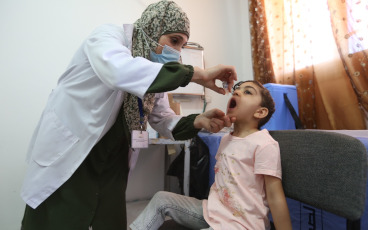On World Polio Day, UNICEF launches new website focusing on global immunization strategies
Social data is 'invaluable'

NEW YORK, USA, 24 October 2011 – Following a dramatic 95 per cent reduction in polio cases last year in Nigeria, the disease is once again on the rise – in large part because of lingering community resistance to polio immunization. To address this resistance, the country recently launched the Polio Free Torch Campaign. Supported by the Nigerian Olympic Committee (NOC) and a number of Nigerian Olympians, the campaign aims to mobilize wide support for the polio eradication efforts currently being made in Nigeria.
Campaigns such as these rely heavily on a range of social data that help shed light on, among other things, the reasons some communities are refusing to vaccinate their children with the oral polio vaccine (OPV). A recently launched website, www.polioinfo.org, will support and strengthen these communication efforts in all the polio priority countries by making this critical social data easier to access.
PolioInfo is linked to the official website of the Global Polio Eradication Initiative, which focuses on the epidemiological and logistical aspects of polio eradication. The two websites will work in harmony to provide a holistic picture of the polio programme to experts and community members.
“If we are to succeed in eradicating polio, we need to reach every last child with vaccine,” said Jos Vandelaer, UNICEF’s Chief of Immunization. “But first we have to reach every last parent and caregiver and ensure they have the knowledge they need to make critical choices about vaccinating their children. This is where timely access to social data is invaluable.”
Challenges and solutions
PolioInfo publishes social risk assessments for each of the eight priority polio-affected countries –Afghanistan, Angola, Chad, the Democratic Republic of the Congo, India, Nigeria, Pakistan and Sudan. These assessments show a variety of risks in each country, such as the risk of communities not being aware of immunization efforts and the risk of parents declining vaccinations.
The website also enables field workers to share and adapt strategies to raise awareness of polio and reach out to community leaders and parents. And it profiles stories collected from experts in the field, showcasing challenges to immunization as well as solutions.
In Chad, for example, where the polio virus has exploded over the last year, many parents refused to have their children vaccinated, fearing the oral polio vaccine would cause anaemia, paralysis or death. Fortunately, four months of awareness-raising by communications experts helped parents understand that vaccination protects children rather than harming them.
By sharing these successful strategies, and by ensuring the best possible data are available to experts, health workers and community leaders, PolioInfo brings the world one step closer to eradication.












